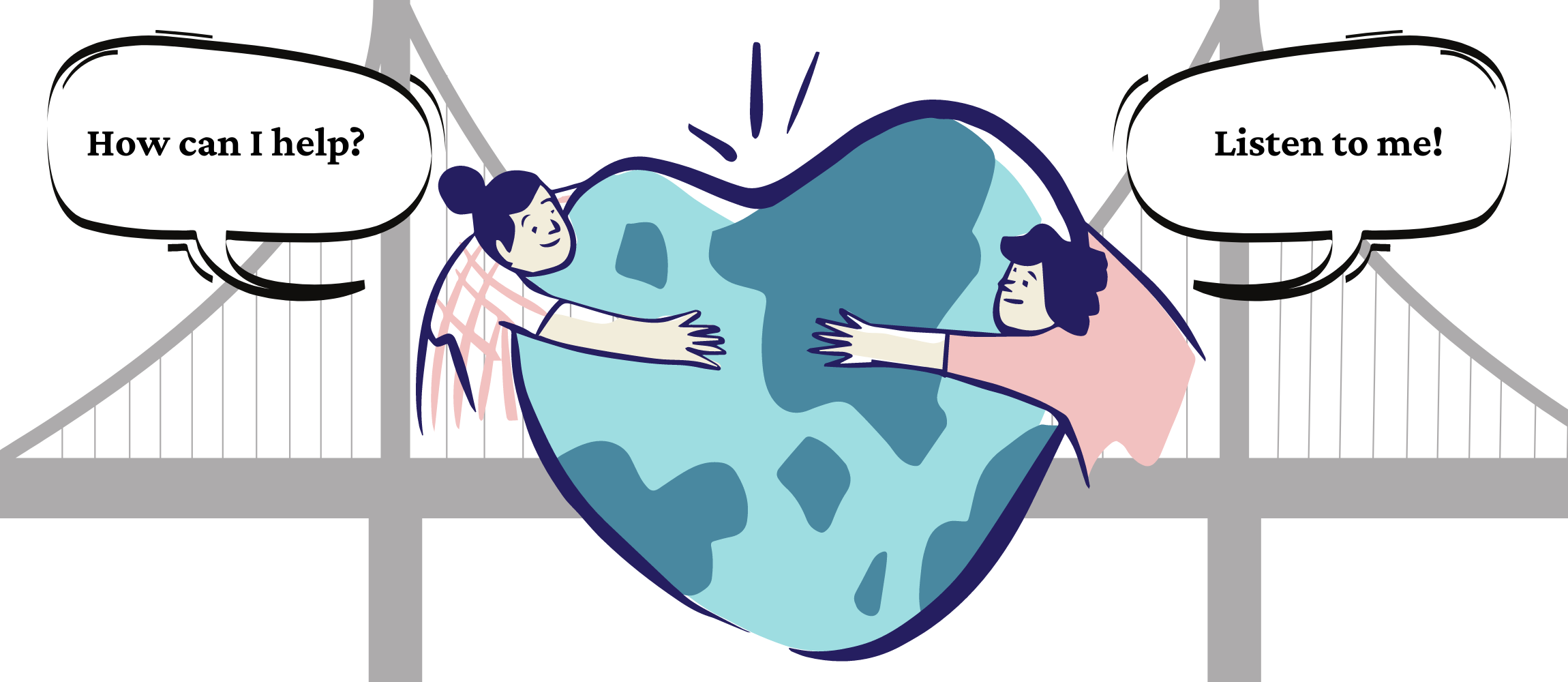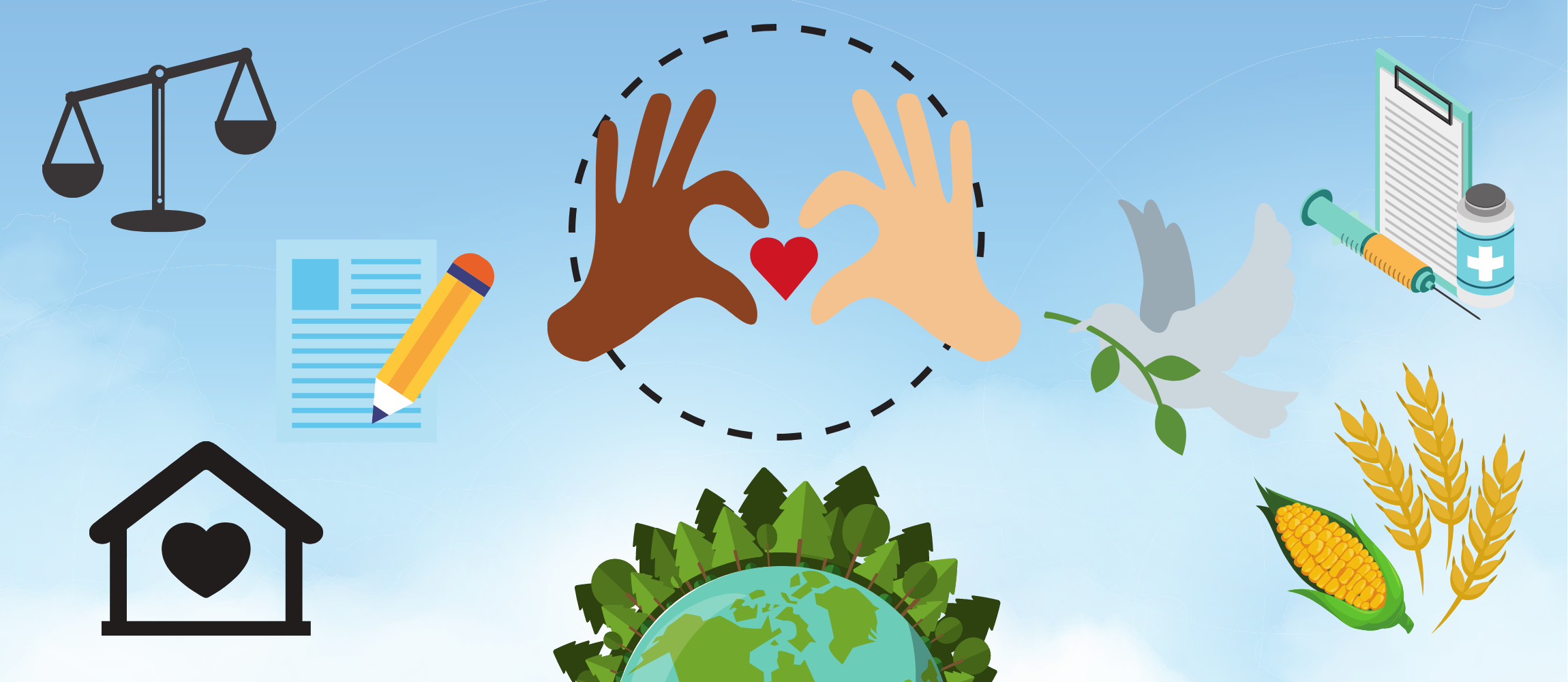What we learn together
How to Help Someone from a Different Background

Sometimes, helping someone can be easy. You see someone struggling to carry something through a doorway? You hold the door or help them with their burden. Being out and about in the world, we encounter lots of small situations with simple, cut-and-dry solutions.
But sometimes, it’s difficult to know the solution to a problem if the circumstances are unfamiliar to you. One example we at The Water Project come by every day is that it can be difficult for someone who has lived their entire life with water readily available within their home, school, and/or workplace to imagine what it’s like to live where water is difficult to find.
Maybe there’s someone within your acquaintance whose experiences differ from yours, and you find yourself curious about how you can (and whether you should try to) impact them for the better. Maybe you wonder if someone whose culture seems so different actually might have things in common with you. Or maybe you’re involved with an organization, movement, or effort and you’re wondering whether its approach is best. How do you know whether you’re creating more problems down the road for your constituents?

Because these kinds of questions often arise in our line of work, I asked two of The Water Project’s staff members – Program Officer Samuel Ngidiwe and Director of Program Spencer Bogle (learn more about them here) – who have lived and worked overseas, how they build proverbial bridges across cultural divides.
How do you find common ground with someone whose life experience is different from yours?
Sam:
Approaching someone with different experiences required me to see my interaction with them as a learning opportunity rather than me wanting to teach them. That was always my attitude and in so doing they became receptive to whatsoever teaching or story I [had] to share with them.
Spencer:
We all need food for the day. We all need water to survive. We all want security for ourselves and our loved ones. We all want to have meaningful work. When we sit at a table to share a meal or a cup of tea with someone else the world is wide open with possibility because we all come with a different story of the challenges we faced along the way. Common ground is always there, and so is the opportunity to connect and to learn by sharing food, drink, work, and perhaps even some security with someone else.
Sometimes we enter into these opportunities as the host, and sometimes as the guest. However, once we sit down to share something that is basic to our own life, the rest is just a matter of listening for the details.
How much does establishing rapport matter when it comes to working with someone from an unfamiliar culture?
Sam:
Establish[ing] rapport is key and matters a lot. When you establish [a] good rapport, you then unlock the trust barrier.
When I established [a] good rapport with someone of unfamiliar culture through my work, they were able to open up and share information they [would] not normally with outsiders. Because you have shown respect to them and their culture, they were able to discuss even issues affecting their personal life.
Without good rapport, trust can’t be built, and it is difficult to be effective whatever you intended [to] accomplish in that culture. By building trust and showing respect, I was able to get elders in the village and rural towns we worked [to] come to me [to] discuss issues and advise us on what was best for their communities.
Spencer:
I find that trust is everything in a relationship. Especially when it comes to working with someone from another culture, we are always discerning motives and assessing whether another person or organization has our best interest at heart. This takes a long time.
One thing that I have found is that the real test of rapport comes when we face challenges together. The times of pressure are both formative and revealing for trust and reputation. When times get hard (like a pandemic), when resources are scarce, and when we lose something or someone precious to us, we see who is still there with us and whether they are making decisions in the best interest of our relationship and wellbeing.
Have you found any values to be universal? If so, which ones?
Sam:
The universal values of respect and humility as you engage with other cultures [are] key.
Spencer:
I truly believe that most all of us are trying to do the best we can with what we have. If you look at the news in Kenya, the U.S., Uganda, or Sierra Leone, the main categories of interest are consistent. Do people have access to care when they are sick? Is it getting harder or easier to pay for food, to get work that will sustain the family, and to communicate with friends and family?
I tend to think there are values that are largely connected to our basic needs and capabilities, which are for the most part universal. Maslow’s hierarchy of needs—physiological, safety, belonging and love, esteem, cognitive, aesthetic, self-actualization, and transcendence—are a great place to start.
I think it is important that people be seen not only in terms of needs but of their capabilities, too. We all value playing a part in our own development, becoming more capable contributors to our own flourishing and the well-being of those around us.

What interpersonal difficulties have you encountered while helping a person or community, if any? Were the challenges you anticipated the ones you faced?
Sam:
The interpersonal difficulties encountered was building trust and good intercultural communication一knowing the appropriateness of words and expressions. The challenges I anticipated [were] mostly language barriers. However, the one I faced was mostly to do with trust.
Spencer:
I was once working with an organization in Uganda that was planning on drilling a well in a community that did not have a source for clean water within the whole community. We did the hydrogeological surveys and identified several locations for drilling in the area. However, a local leader demanded that the well be drilled on his property. This led to conflict within the community and between part of the community who supported this leader and our organization.
I tend to think that power differentials and trust are at the heart of most interpersonal difficulties. We are always making assessments of who is in control, and whether we can trust that person, organization, or institution.
In this drilling situation, we saw several people representing different loci of power come to a disagreement. The individuals in the community, the local leaders, and our organization comprised of Ugandan leaders and leaders from the U.S., were faced with hard decisions on whether or not to proceed with the project and how to move forward (we chose to move to another community).
Social difficulties like this are the toughest to navigate. If the difficulty is lack of resources or technological, the problems are solvable with good communication and coordination if the people involved can find a way to navigate the social challenges. However, if there is no trust in the relationships, solutions that integrate the best technology and greatest resources will not provide lasting benefit.
What advice would you give to someone who is interested in helping others across cultures?
Sam:
My advice will be to go as [a] learner and not as a teacher. Listen more, avoid comparing things (like “my home country is better than yours,” or “…culture is better than yours”). Be flexible and ready to embrace changes.
Spencer:
Anyone’s interest in helping other people across cultures is a beautiful revelation of their character一they desire a better life for others in the world with whom they share no family, heritage, or boundary. A desire for the betterment of humanity is a wonderful place to start.
My advice is to enter into relationships with humility. Look for the best in people. Pay attention to who gets to talk about problems一voice is power. Be vulnerable, because if it is not awkward, you are not participating in a real relationship. Understand that the world is complex and no one person or organization is going to be the hero when we enter into relationships with people halfway around the globe.
Often times we create more problems than we solve when we “help” without taking the time to learn about someone else’s story and what they are trying to achieve. However, we live in a world where information, communication, and travel is more accessible than ever before. There are opportunities to learn and connect. Focused, relational involvement is the best way to make a positive impact with and for others.
Click here to learn more about Sam and Spencer’s backgrounds. For more information about The Water Project’s approach to involving community members in the solutions that will impact their own lives, read about our process and our commitment to community engagement.
Home More Like ThisTweet